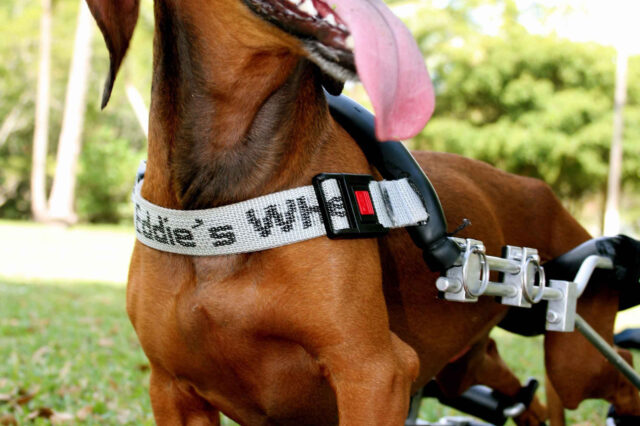Paralyzed dog inspires others living active life on wheels

Although he can no longer move his two back legs, a charismatic dachshund named Lance hasn't missed a beat. Far from being an armchair participant in life, Lance, who received treatment at UF's Veterinary Medical Center earlier this year, is a wheelchair participant — actively bringing cheer to the sick and disabled, young and old.
After consulting with University of Florida veterinarians, Lance, a dachshund, was fitted with a custom-made cart that supports his paralyzed hind legs, allowing him to walk and run. Lance’s owners say he still loves chasing his Frisbee and ball at the park, where he is always a celebrity.
After an unsuccessful operation in South Florida, Lance's owner, Claudia Machado, of Miami, came to UF to see whether UF could correct Lance's problems through additional surgery.
"Unfortunately, the spinal cord at the affected segment was only a cavity with no substance, so surgery was not going to help," said veterinarian Roger Clemmons, a neurologist specializing in small animals who saw Lance in the UF clinic.
"The technology to re-grow spinal cords in dogs does not exist," Clemmons said. "Although advances are being made in using primitive ‘stem cells' to help repair the spinal cord in dogs, these cells have not been used in dogs successfully for that purpose, so we did not have any options to offer for Lance's treatment at that time."
However, Machado and her family were told how to adapt to life with Lance as a paraplegic.
"We had to come to terms with the news that Lance would never be able to use his back legs again," said Machado. "Dr. Clemmons was emphatic that there was no solution, and his staff, especially Amy Reynolds, gave me and my husband a lot of support to deal with this reality. Needless to say, we were devastated, but we never gave up on our little guy for a second."
Clemmons and Reynolds, a veterinary neurology technician, suggested the wheels and gave Machado tips on how to properly care for a paralyzed dog. They also recommended a diet including natural-vitamin supplements to help boost Lance's immune system and prevent additional damage.
Machado purchased a special custom-made "doggie wheelchair," or cart made for dogs with hind-leg paralysis, to which Lance quickly adapted. The cart supports his hind legs and is attached with a small harness, allowing him to walk and run using his front legs.
After consulting with University of Florida veterinarians, Lance, a dachshund, was fitted with a custom-made cart that supports his paralyzed hind legs, allowing him to walk and run.
"Even though we didn't come back to Miami with the news we hoped for, we were very optimistic," Machado said. "Words cannot explain how much comfort Amy offered, sharing her own stories with us and reassuring us that Lance being on wheels would just make us love him even more. And today, every time I have a question for Dr. Clemmons because Lance is acting weird, I e-mail Amy with concerns and I hear back from her immediately."
While Lance's paralysis is still tough on Machado and her family emotionally, they have gotten into a fun routine with him and take comfort in the happiness he brings other people.
"Lance is the happiest dog on the wheelchair," Machado said. "He's full of energy and loves to fetch his ball at the park, run after his Frisbee and swim. Everywhere we take him, people stop and stare at him because he truly is one special little guy."
Lance is now a certified therapy dog and Machado takes him twice a month to visit pediatric patients at Miami Children's Hospital and elderly individuals in wheelchairs at West Gables Hospital.
"He gives them so much hope and joy," Machado said. "I don't think there's anything more fulfilling than walking down the hospital corridor with this little guy. He is a superhero."
Lance even has that "Hollywood effect" on people who see him.
"It's like going out with Britney Spears," Machado said. "Everyone runs over to see him, pet him or play with him."
In fact, "Super Lance," starring as himself, will be the main character in a book Machado is producing for distribution to hospital patients.
"All of the work for this book is pro bono," she said. "I had my friends design the logo, write the story, design the animated characters for the book and finally have it printed. It was a true effort of family and friends coming together for a good cause."
About the author
